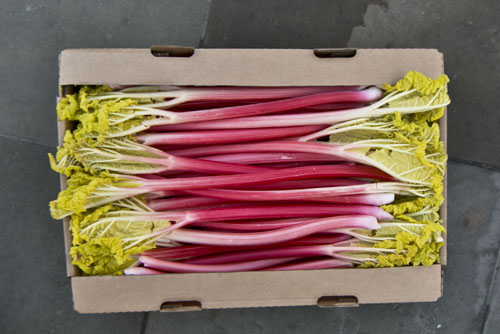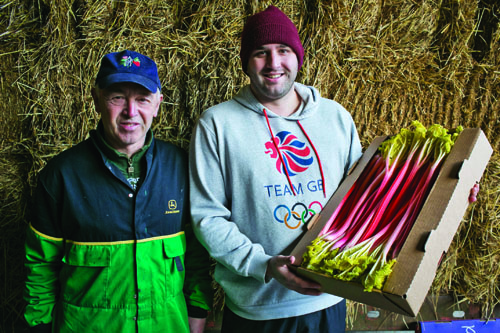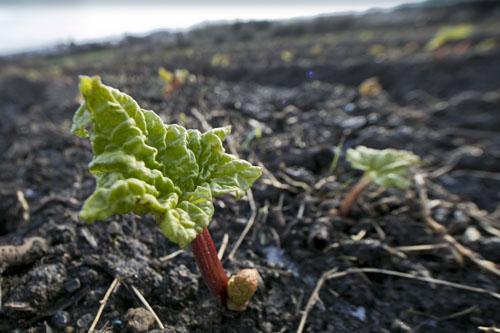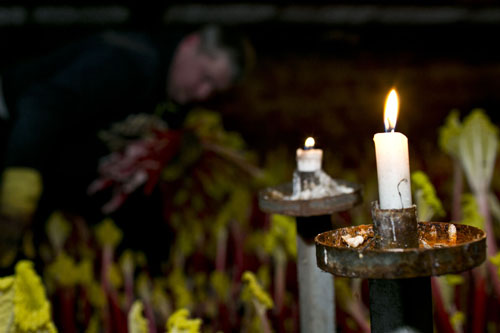Supplier spotlight: Forced rhubarb
Yorkshire's Rhubarb Triangle is home to the fantastic fruit in both its outdoor-grown and forced forms. New Covent Garden Market provides an insight on the growers who supply its wholesalers
"There are an awful lot of growers up there," explains Eddie Barrett at HG Walker, a wholesaler on New Covent Garden Market. "And they are all good."
Forced rhubarb is famous for its neon pink colour, tender stems (petioles) and low acidity, compared to outdoor-grown rhubarb.
Yorkshire rhubarb
- The product was granted Protected Designation of Origin (PDO) status in 2010.
- At New Covent Garden Market, rhubarb is sold by several wholesalers, including HG Walker, Fenn & Hexton and P&I
- The Wakefield Food, Drink and Rhubarb Festival takes place on 19-21 February
The grower
Neil and James Hulme
Many Yorkshire growers are family businesses that stretch back generations, such as E Oldroyd & Sons.
"My sons are the fifth generation in rhubarb," says Janet Oldroyd Hulme. "We have been involved in agriculture as far back as we can trace.
"My father arrived in the area in the 1930s, having lost everything in the Depression, and came up here to start again."
Their firm now manages more than 200 acres of open land, including seven forcing sheds for indoor rhubarb. They use nine different varieties of rhubarb plant to stretch the season.
The forcing process was first discovered in 1817 in the Chelsea Physic Garden in London. The plant, which originates from Siberia, was previously used as a medicine.
"It was the wonder drug," explains Olroyd Hume. "They used it for anything and everything. Its use goes back to 2700 BC."
The challenge
There are some challenges for the growers in Yorkshire. A warming climate poses serious problems for a plant that requires freezing temperatures to trigger it into dormancy.
"Nature has just turned on its head, unfortunately," says Janet Oldroyd Hulme. Her father used to finish harvesting outdoor rhubarb in August, and the forced rhubarb crop would arrive before Christmas. Now, because of milder weather, the Oldroyds are cropping outdoors throughout October. Their season for forced rhubarb is shorter now, too, and runs roughly from mid-January to March.
With energy costs spiking in recent years, the cost of heating the sheds is another challenge. Wind turbines, solar panels or anaerobic digesters are possible solutions.
How it grows
In Yorkshire, rhubarb destined for the forcing sheds is grown in open fields for two years in order for the root to store up energy for the forcing process.
The root systems are then carefully lifted and moved to the insulated forcing sheds - some of the root systems in Yorkshire take two people to lift them.
Once they have packed the sheds with up to 15,000 roots, the growers simulate the arrival of spring.
"Everything we do then is a trick," explains Olroyd. The sheds are heated and sprinklers are used.
"Spring rain helps the plant grow and wakes it up - so we provide that."
Light is excluded from the sheds, so growers pick by candlelight with corner lights also used nowadays for health and safety reasons.
The atmosphere of the sheds is unique: warm, humid and sonically bizarre, with the squelch of boots in the soil and the snap, snap, snap of the picking process, as the petioles are tugged from the root.
Once a shed has been worked over, the rhubarb is taken back to the pack house for grading.
Contact
New Covent Garden Marketwww.newcoventgardenmarket.com















